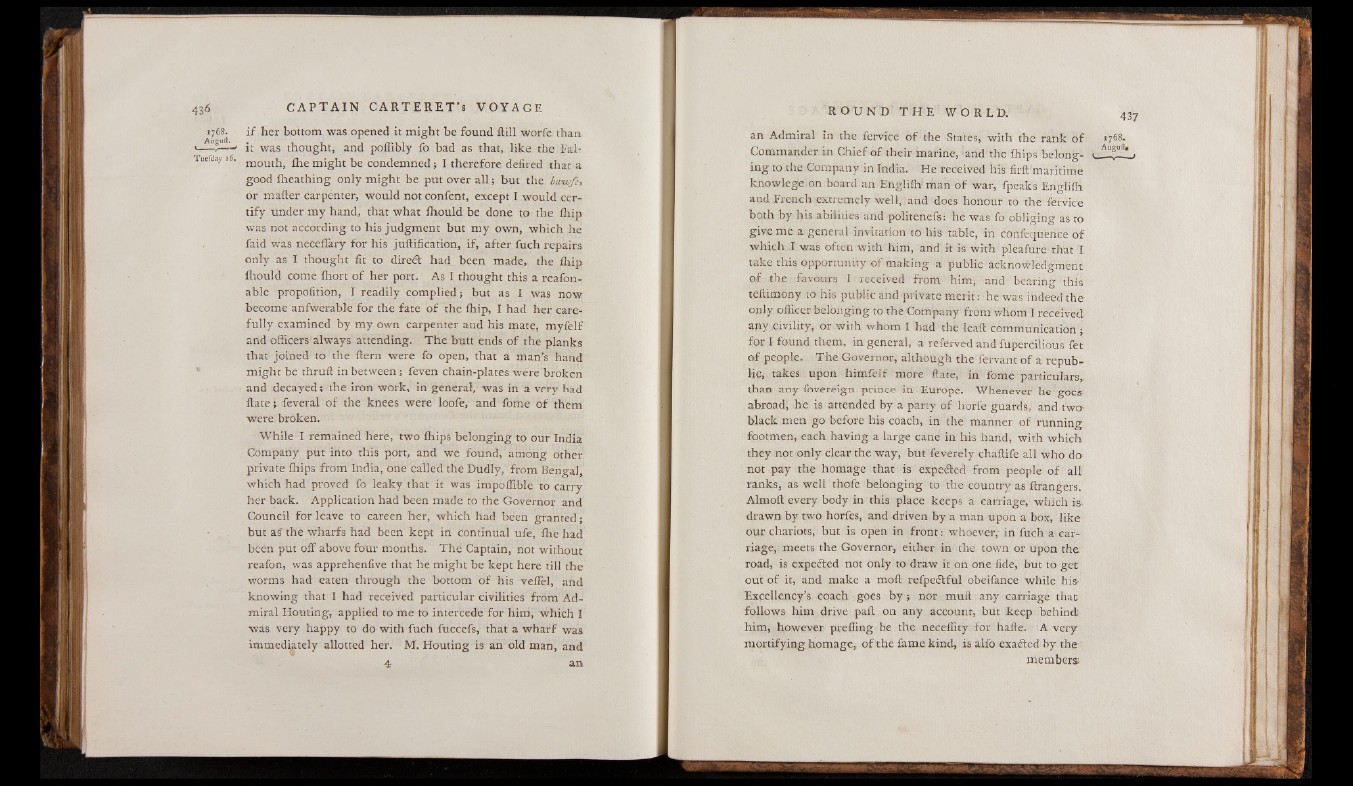
1768. i f her bottom was opened it might be found ftill worfe than
>— — ' it was thought, and poflibly fo bad as that, like the Fal-
Tuefday 16. moutj1) fhe might be condemned; I therefore defired that a
good fheathing only might be put over a l l ; but the ba-wfe,
or matter carpenter, would not confent, except I would certify
under my hand, that what Ihould be done to the fliip
was not according to his judgment but my own, which he
faid was neceflary for his juftification, if, after fuch repairs
only as I thought fit to direct had been made, the fliip
fliould come fhort o f her port. As I thought this a reafon-
able propofition, I readily complied; but as I Was now
become anfwerable for the fate o f the fhip, I had her carefully
examined by my own carpenter and his mate, myfelf
and officers always attending. The butt ends of the planks
that joined to the ftern were fo open, that a man’s hand
might be thruft in between; feven chain-plates were broken
and decayed; the iron work, in general, was in a very bad
ftate; feveral of the knees were loofe, and fome o f them
were broken.
While I remained here, two fhips belonging to our India
Company put into this port, and we found, among cither
private fhips from India, one called the Dudly, from Bengal,
which had proved fo leaky that it was impoflible to carry
her back. Application had been made to the Governor and
Council for leave to careen her, which had been granted;
but aS the wharfs had been kept in continual ufe, fhe had
been put off above four months. The Captain, not without
reafon, was apprehenfive that he might be kept here till the
worms had eaten through the bottom o f his veflel, and
knowing that I had received particular civilities from Admiral
Houting, applied to me to intercede for him, which I
was very happy to do with fuch fuccefs, that a wharf was
immediately allotted her. M. Houting is an old man, and
4 an
an Admiral in the fervice of the States, with the rank o f 1768.
Commander in Chief o f their marine, and the fhips belong- ■ Auf
ing to .the Company in India. He received his firft'maritime
knowlege.on board an Englifh man o f war, fpeaks Englifh
and French extremely well, and does honour to the fervice
both by his abilities and politenefs: he was fo obliging as to
give me a general invitation to his table, in confequence o f
which I was often with him, and it is with pleafure that I
take this opportunity of making a public acknowledgment
o f the favours I received from him, and bearing this
teftimony to his public and private merit; he was indeed the-
only officer belonging to the Company from whom I received
any .Civility, or with whom I had the leaft communication ;
for I found them, in general, a referved and fupercilious fet
o f people. The Governor, although the fervant o f a republic,
takes upon himfelf more ftate, in fome particulars,
than any fovereign prince in Europe. Whenever he goes
abroad; he is attended by a party of horfe guards, and two-
black men go before his coach, in the manner o f running:
footmen, each having a large cane in his hand, with which
they not only clear the way, but feverely chaftife all who do
not pay the homage that is expedted from people of all
ranks, as well thofe belonging to the country as ftrangers.
Almoft every body in this place keeps a carriage, which is,
drawn by two horfes, and driven by a man upon a box, like
our chariots, but is open in front: whoever, in fuch a carriage,
meets the Governor, either in the town or upon the
road, is expedted not only to draw it on one fide, but to get
out of it, and make a moft refpedtful obeifance while his-
Excellency’s coach goes by ; nor mutt any carriage that
follows him drive paft on any account, but keep behind
him, however preffing be the neceffity for hafte. A very
mortifying homage, of the lame kind, is alfo exadted by the
members